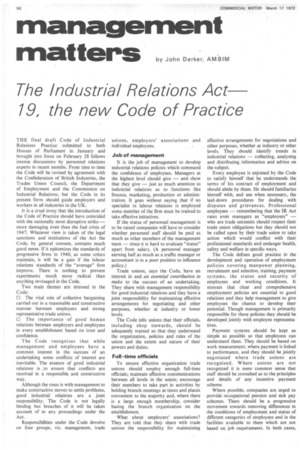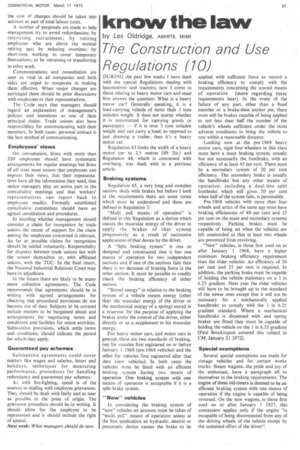management
Page 58

Page 59

If you've noticed an error in this article please click here to report it so we can fix it.
matters by John Darker, AIVC131M
The Industrial Relations Act 19, the new Code of Practice
THE final draft Code of Industrial Relations Practice submitted to both Houses of Parliament in January and brought into force on February 28 follows intense discussions by personnel relations experts in recent months. From time to time the Code will be revised by agreement with the Confederation of British Industries, the Trades Union Council, the Department of Employment and the Commission on Industrial Relations, but the Code in its present form should guide employers and workers in all industries in the UK.
It is a cruel irony that the introduction of the Code of Practice should have coincided with the nationally most disruptive strike — more damaging even than the fuel crisis of 1947. Whatever view is taken of the legal sanctions and institutions of the Act the Code, by general consent, contains much good sense. If it epitomizes the standards of progressive firms in 1940, as some critics maintain, it will be a gain if the labour relations standards of the "average" firm improve. There is nothing to prevent experiments much more radical than anything envisaged in the Code.
Two main themes are stressed in the Code: The vital role of collective bargaining carried out in a reasonable and constructive manner between employers and strong representative trade unions.
The importance ' of good human relations between employers and employees in every establishment based on trust and confidence.
The Code recognizes that while management and employees have a common interest in the success of an undertaking some conflicts of interest are inevitable. The essence of good industrial relations is ,to ensure that conflicts are resolved in a responsible and constructive way.
Although the onus is with management to make constructive moves to settle problems, good industrial relations are a joint responsibility. The Code is not legally binding but breaches of it will be taken account of in any proceedings under the Act.
Responsibilities under the Code devolve on four groups, viz, management, trade unions, employers' associations and individual employees.
Job of management It is the job of management to develop industrial relations policies which command the confidence of employees. Managers at the highest level should give — and show that they give — just as much attention to industrial relations as to functions like finance, marketing, production or administration. It goes without saying that if no specialist in labour relations is employed some member of the firm must be trained to take effective initiatives.
If the status of personnel management is to be raised companies will have to consider whether personnel staff should be paid as much as other members of the management team — since it is hard to evaluate "status" apart from salary. (A personnel manager earning half as much as a traffic manager or accountant is in a poor position to influence policy.)
Trade unions, says the Code, have an interest in and an essential contribution to make to the success of an undertaking. They share with management responsibility for good industrial relations and they have a joint responsibility for maintaining effective arrangements for negotiating and other purposes, whether at industry or lower levels.
The Code tells unions .that their officials, including shop stewards, should be adequately trained so that they understand the organization, policies and rules of the union and the extent and nature of their powers and duties.
Full-time officials
To ensure effective organization trade unions should employ enough full-time officials; maintain effective comMunications between all levels in the union; encourage their members to take part in activities by holding branch meetings at times and places convenient to the majority and, where there is a large enough membership, consider basing the branch organization on the establishment.
What about employers' associations? They are told that they share with trade unions the responsibility for maintaining effective arrangements for negotiations and other purposes, whether at industry or other levels. They should identify trends in industrial relations — collecting, analysing and distributing information and advice on the subject.
Every employee is enjoined by the Code to satisfy himself that he understands the terms of his contract of employment and should abide by them. He should familiarize himself with, and use when necessary, the laid-down procedures for dealing with disputes and grievances. Professional employees — remembering that the IR Act rates even managers as "employees" — who are trade unionists should respect their trade union obligations but they should not be called upon by their trade union to take action which would conflict with their professional standards and endanger health, safety and welfare in specific ways.
The Code defines good practice in the development and operation of employment policies covering manpower planning, recruitment and selection, training, payment systems, the status and security of employees and working conditions. It stresses that clear and comprehensive employment policies are essential to good relations and they help management to give employees the chance to develop their potential. Though management is primarily responsible for these policies they should be developed jointly with employee representatives.
Payment systems should be kept as simple as possible so that employees can understand them. They should be based on work measurement, where payment is linked to performance, and they should be jointly negotiated where trade unions are recognized. Where unions are not recognized it is mere common sense that staff should be consulted as to the principles and details of any incentive payment scheme.
Where possible, companies are urged to provide occupational pension and sick pay schemes. There should be a progressive movement towards removing differences in the conditions of employment and status of different categories of employees and in the facilities available to them which are not based on job requirements. In both cases, the cost of changes should be taken into account as part of total labour costs.
A number of proposals are made to help management try to avoid redundancies: by restricting recruitment; by retiring employees who are above the normal retiring age; by 'educing overtime; by short-time working to cover temporary fluctuations; or by retraining or transferring to other work.
Communications and consultation are seen as vital in all companies and both sides are urged to cooperate in making them effective. When major changes are envisaged there should be prior discussions with employees or their representatives.
The Code says that managers should regard an explanation of management's policies and intentions as one of their principal duties. Trade unions also have responsibility for communicating with their members. In both cases, personal contact is the best method of communicating.
Employees' views
On consultation, firms with more than 250 employees should have systematic arrangements for regular meetings but firms of all sizes must ensure that employees can express their views, that their representatives have all the information they need, that senior managers play an active part in the consultative meetings and that workers' representatives can report back to employees readily. Formally established consultative committees should have an agreed constitution and procedures.
In deciding whether management should consider a claim for recognition by trade unions the extent of support for the claim among the employees concerned is relevant. As far as possible claims for recognition should be settled voluntarily. Responsibility for disputes between trade unions lies with the unions themselves or, with affiliated unions, with the TUC. In the final resort, the National Industrial Relations Court may have to adjudicate.
In the future there are likely to be many more collective agreements. The Code recommends that agreements should, be in writing with agreed arrangements for checking that procedural provisions do not become out of date. Subjects to be covered include matters to be bargained about and arrangements for negotiating terms and conditions and facilities for union activities. Substantive provisions, which settle terms and conditions, should indicate the period for which they apply.
Guaranteed pay schemes Substantive agreements could cover matters like wages and salaries, hours and holidays, techniques for measuring performance, procedures for handling redundancy and guaranteed pay schemes.
As with fire-fighting, speed is of the essence in dealing with employee grievances. They should be dealt with fairly and as near as possible to the point of origin. The grievance procedure should be in writing. It should allow for the employee to be represented and it should include the right of appeal.
Next week: What managers should do now.










































































































